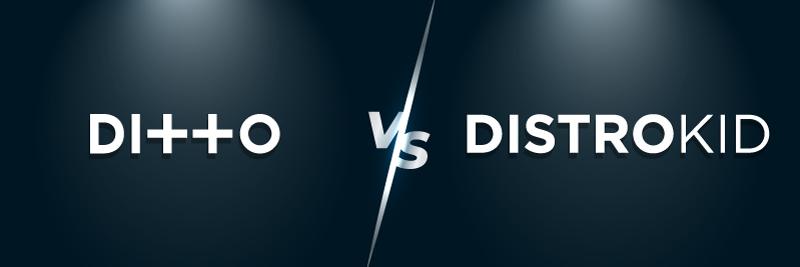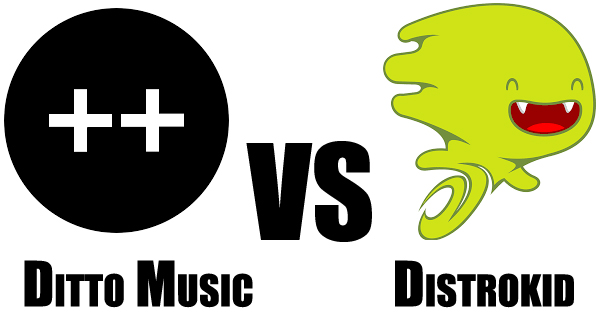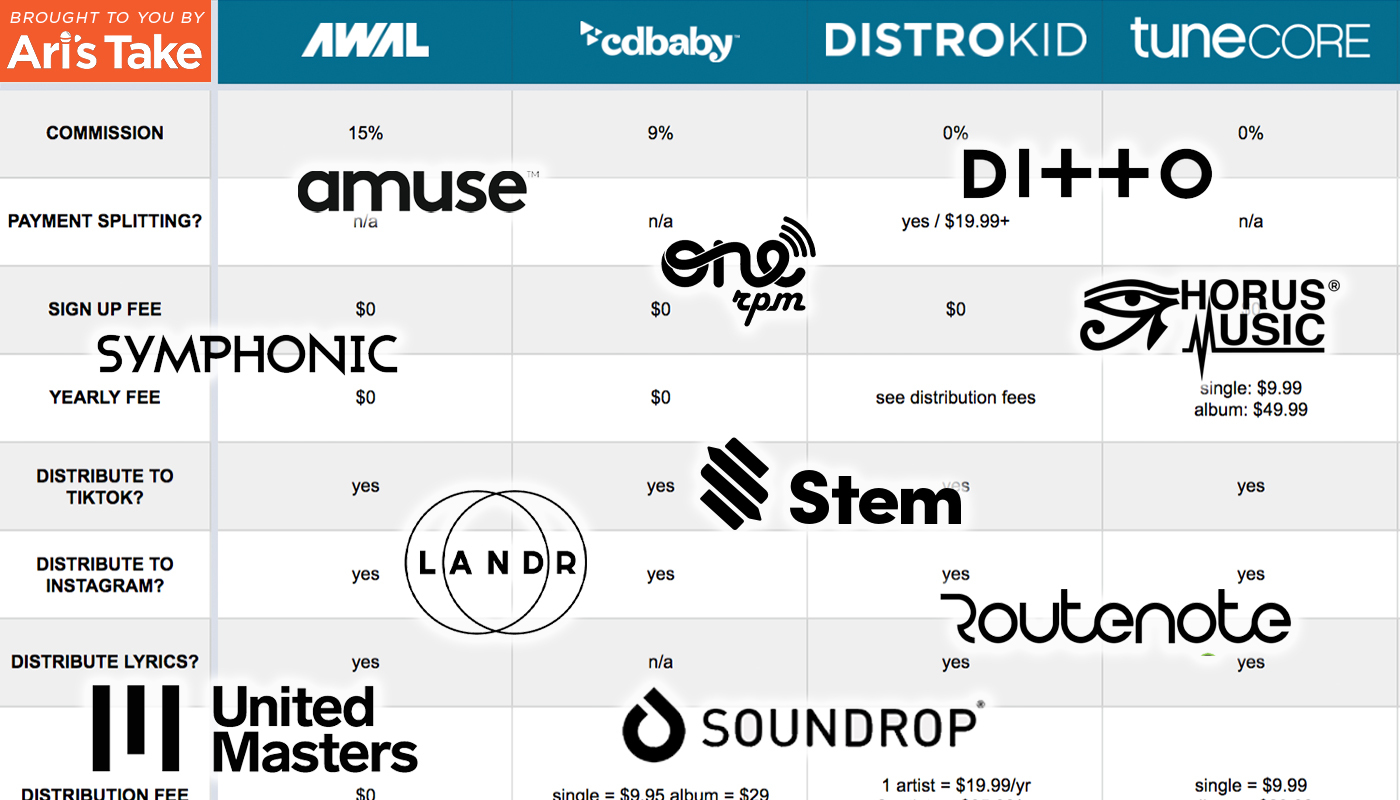Ditto and DistroKid are both popular digital distribution platforms, but DistroKid is the better choice due to its affordability and features. When it comes to digital distribution for musicians, choosing the right platform can be a game-changer for their career.
We will compare Ditto and DistroKid, from our experience using both platforms, to help musicians make the right decision for their music. We will take a closer look at the pricing, features, ease of use, and customer support of both platforms.
By the end of this article, you will have a clear understanding of the differences between Ditto and DistroKid, and which platform is the best fit for you.
Pricing
After testing both Ditto and DistroKid, we found that DistroKid offers better pricing options for independent musicians in terms of unlimited album uploads and lower distribution fees. However, Ditto provides a more personalized customer service experience and additional features such as YouTube money and label services.
Pricing is a crucial factor when it comes to choosing between music distributors Ditto and DistroKid. Both the platforms offer competitive pricing plans with different features. In this post, we will discuss and compare the pricing plans offered by Ditto and DistroKid.
Ditto Pricing
Ditto offers three affordable pricing plans for music distribution: Single, EP, and Album. The Single plan costs $9 per release, the EP plan costs $29 per year, and the Album plan costs $19 per year. With each plan, you get unlimited releases, and Ditto does not take any percentage of your royalties. The Single plan is perfect for independent artists who only release one track at a time, while the other plans are suitable for musicians who release multiple tracks throughout the year.
Distrokid Pricing
DistroKid, on the other hand, offers four pricing plans: Musician, Musician Plus, Label, and Label Plus. The Musician plan costs $19.99 per year, while the Musician Plus plan costs $35.99 per year. These plans allow you to distribute unlimited tracks, and DistroKid does not take any percentage of your royalties. The Label plan costs $79.99 per year and allows you to distribute music for up to five artists. The Label Plus plan costs $159.99 per year and allows you to distribute music for up to 100 artists.
Comparison Of Pricing Plans
When comparing the pricing plans of Ditto and DistroKid, we can see that both platforms offer competitive pricing plans with different features. However, Ditto’s pricing plans are more affordable for independent artists who only release one or two tracks per year. In contrast, DistroKid’s pricing plans are ideal for musicians who release multiple tracks throughout the year. In conclusion, both Ditto and DistroKid offer competitive pricing plans that cater to the needs of different musicians. The choice between the two platforms will ultimately depend on your specific needs and requirements as an artist.
Features
After using both Ditto and DistroKid, we concluded that DistroKid is the better option. With lower fees, more platforms, and quicker distribution, it’s the ideal choice for independent musicians seeking a reliable distributor.
When it comes to choosing a music distribution platform, the features available can greatly impact your decision. In this section, we’ll take a closer look at the features offered by Ditto and DistroKid.
Ditto Features
Ditto offers a range of useful features that can help independent musicians and labels manage their music distribution needs. Here are some of the most notable features that Ditto offers:
- Unlimited uploads: Ditto allows users to upload as many tracks as they want, at no extra cost.
- Spotify pre-save: This feature allows users to create custom pre-save campaigns on Spotify to build excitement and promote their music ahead of release day.
- YouTube Content ID: This feature helps musicians and labels find and monetize any videos on YouTube that use their music.
- Customizable release dates: Users can choose the street date for their release within a certain date range to coincide with events such as gigs or promotions.
Distrokid Features
DistroKid, on the other hand, also offers an impressive list of features aimed at making music distribution as easy and stress-free as possible. Here are some of DistroKid’s standout features:
- Fast upload times: DistroKid’s servers are optimized for speed, meaning users can upload and release their tracks faster than ever before.
- Instant Spotify verification: This feature allows users to instantly verify their artist profile on Spotify and customize their profile image, bio, and playlists.
- Apple Music for Artists: This feature provides users with detailed analytics and insights into how their music is performing on Apple Music.
- Playlist pitching: DistroKid offers users the ability to pitch their music to Spotify’s editorial team for a chance to be featured on popular playlists.
Overall, Ditto and DistroKid offer many similar features, such as worldwide distribution, a user-friendly dashboard, and pricing that is competitive with other distribution platforms on the market. Ultimately, choosing between the two will come down to which features are most important to you and your individual needs as an independent musician or label.
User Experience
One of the most important factors to consider when choosing a music distribution service is user experience. From uploading and distributing music to navigating the dashboard and accessing customer support, the entire process should be simple and straightforward. In this section, we’ll take a closer look at the user experience of both Ditto and DistroKid.
Ditto User Experience
The Ditto user experience is designed to be as user-friendly as possible. The upload process is simple, and the dashboard is easy to navigate with intuitive icons and clear instructions. Ditto’s customer service team is reliable and prompt in answering questions and providing support, which is a huge plus for independent artists who may need assistance managing their content. Additionally, Ditto offers a range of additional services, such as sync licensing and YouTube Content ID, which are easy to use within the platform.
Distrokid User Experience
DistroKid has a similarly user-friendly interface, with a clean and clear dashboard that is easy to navigate. However, DistroKid’s upload process may be a bit more complicated for some users, as it requires additional steps such as adding album artwork and specifying release dates. Customer support is generally reliable, although some users have reported longer response times during peak periods. DistroKid is known for its fast distribution times, with music often appearing on streaming services within 24 hours.
In conclusion, both Ditto and DistroKid offer a user-friendly experience, with simple interfaces and intuitive navigation. However, Ditto’s additional services and reliable customer support may give it an edge over DistroKid for some independent artists.

Credit: majormixing.com
Customer Support
After using both Ditto and DistroKid for customer support, we found that DistroKid provided better and faster responses. Their team was more attentive and resolved our issues quickly. Overall, we recommend DistroKid for their excellent customer service.
Ditto Customer Support
Ditto prides themselves on their approachable and responsive customer support team. Their customer support is accessible through both email and phone, and they respond quickly to inquiries, ensuring the problem is resolved efficiently. Additionally, Ditto provides a comprehensive ‘help’ section on their website, which contains detailed answers to frequently asked questions. In case of any problems, their support team is always ready to assist their customers.
Distrokid Customer Support
DistroKid also has a responsive customer support team, and they claim to respond to queries and questions within 24 hours. However, their customer support is only available through email. Unlike Ditto, DistroKid’s website doesn’t have a comprehensive ‘help’ section. Instead, they rely on a library of knowledge articles that customers can browse through to solve their problems.
What We Learned From Using Both
Our experience with both Ditto and DistroKid’s customer support was positive. However, we found Ditto’s customer support to be more readily available and approachable. The fact that they offer both phone and email support made communication easier and more effective. DistroKid’s email-only support created some frustrations, and their knowledge library wasn’t always comprehensive. In conclusion, when choosing between Ditto and DistroKid, the level and quality of customer support might be a crucial factor to consider. Although both platforms have responsive customer support, Ditto’s approachable and comprehensive customer support set them apart.
Pros And Cons
After using both Ditto and DistroKid, we concluded that Ditto’s customer service is excellent and they are better for established artists. However, DistroKid offers better pricing options for new and independent artists. It ultimately depends on an artist’s individual needs and preferences.
Pros and Cons: Choosing between distribution platforms for your music can be a daunting task, especially with the numerous options available in the market. This Blog post will compare two popular music distributors – Ditto and DistroKid. Both services have their advantages and disadvantages, and we will help you make an informed decision based on our experience using both platforms. Ditto pros and cons: Ditto is a UK-based digital music distributor that offers a simple and straightforward pricing model. Their service includes unlimited uploads, real-time sales reporting, and unbeatable customer support. Additionally, Ditto offers a dashboard that allows artists to sync data from various platforms, including Spotify, Apple Music, and Deezer. However, Ditto has some drawbacks. One major limitation of Ditto is that they do not distribute directly to YouTube and SoundCloud, which could hinder your reach among audiences on these popular platforms. DistroKid pros and cons: Founded in 2013, DistroKid is a popular digital music distribution platform that offers unlimited uploads, real-time sales and streaming reports, fast distribution, and transparent pricing. The platform also offers a unique feature known as ‘Teams,’ which allows multiple artists to access and manage a single account. DistroKid has a massive network that includes over 150 digital music platforms worldwide, including the likes of YouTube, Spotify, and Deezer. However, DistroKid’s pricing model can be a little complex for first-time users, with add-on features offered at an extra cost. Overall: In conclusion, choosing between Ditto and DistroKid depends on your needs and preferences. If you are looking for a straightforward pricing plan, unbeatable customer support, and the ability to sync data across various platforms, Ditto could be the perfect partner. On the other hand, if you are looking for a distributor with massive reach, real-time sales reporting, and the ability to distribute to popular platforms like YouTube and SoundCloud, DistroKid might be the way to go. Regardless of the platform chosen, both services offer unique features to help your music reach a wider audience.

Credit: www.musicguymastering.com

Credit: aristake.com
Frequently Asked Questions Of Ditto Vs Distrokid Which Is Better What We Learned From Using Both
Is Ditto Music Better Than Distrokid?
Both Ditto Music and DistroKid are popular and reliable music distributors. It ultimately depends on your personal preferences and needs. Ditto Music offers more personalized support and hands-on services, while DistroKid focuses on affordable pricing and unlimited releases. Consider your priorities before deciding which platform to use.
Is Ditto Publishing Worth It?
It depends on your specific publishing needs. Ditto Publishing offers a range of self-publishing services that could be beneficial for some authors. However, it’s important to weigh the costs and benefits before making a decision.
Can I Trust Ditto Music?
Yes, you can trust Ditto Music. As a leading independent distributor, they have a proven track record of helping artists get their music into the biggest digital music stores worldwide. They also offer a range of helpful services and tools to help promote your music.
What Is The Disadvantage Of Distrokid?
DistroKid’s major disadvantage is that it doesn’t offer physical distribution services, meaning you can’t sell CDs or vinyl. Also, some users report issues with customer support and payment processing.
Conclusion
Both Ditto and DistroKid offer unique features and advantages to aspiring music artists. By using both services, we learned that Ditto is an excellent choice for artists seeking more support and promotions, while DistroKid provides an easy-to-use platform for independent artists looking to distribute their music independently.
Ultimately, the choice between Ditto and DistroKid comes down to the artist’s specific needs and preferences. By conducting thorough research and testing, musicians can make an informed decision on which platform is best for them.